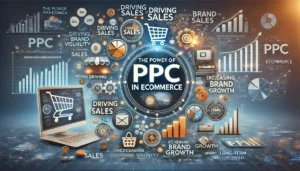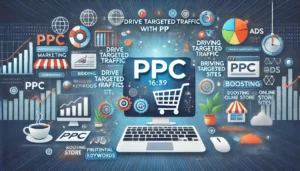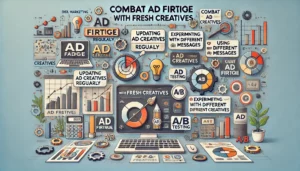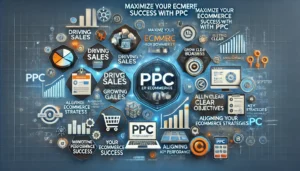Beyond Clicks: Unlocking the True Potential of PPC for eCommerce

Pay-Per-Click (PPC) advertising is more than just a way to get clicks. For eCommerce businesses, it’s a powerful tool to drive sales, increase brand visibility, and achieve long-term growth. In this article, we’ll explore how PPC can be used effectively in the eCommerce world and how it aligns with broader business goals.
Key Takeaways
- PPC is not just about getting clicks; it’s about driving meaningful actions like sales and sign-ups.
- Setting clear objectives is crucial for a successful PPC strategy.
- PPC should be integrated with your overall marketing plan for the best results.
- Key metrics such as Click-Through Rate (CTR) and Return on Ad Spend (ROAS) help measure PPC success.
- Overcoming challenges like budget constraints and ad fatigue is essential for long-term success.
Understanding PPC: Beyond Just Clicks
The Evolution of PPC Advertising
PPC, or Pay-Per-Click, advertising has come a long way since its inception. Initially, it was all about getting clicks, but now it’s about much more. Google ads PPC has evolved to offer detailed analytics, allowing you to see how your campaigns are performing. This means you can keep improving them over time. The pay-per-click model helps you manage costs because you only pay when someone clicks your ad. Plus, you can change your budget and strategies quickly to get the best results. This mix of speed, accuracy, and cost-effectiveness makes PPC a strong tool for any marketer.
How PPC Works for eCommerce
In eCommerce, PPC is crucial for driving targeted traffic to your website. By bidding on the right keywords, your ads show up for people who are already looking for products like yours. This is where Google Adwords PPC comes into play. It helps you reach potential customers who are ready to buy. The flexibility of PPC allows you to adjust your campaigns based on performance, making it easier to achieve your business goals.
Common Misconceptions About PPC
Many people think PPC is just about getting clicks, but it’s much more than that. One common myth is that PPC is too expensive. However, with a proper Google ads audit, you can find ways to make your campaigns more cost-effective. Another misconception is that PPC doesn’t help with brand visibility. In reality, PPC can significantly enhance your brand’s presence online. Working with Google ads agencies or Google advertising agencies can also help you navigate these challenges and get the most out of your PPC campaigns.
To truly harness the power of your PPC data, consider these pivotal aspects:
The identification of trends that indicate shifts in consumer behaviour.
Analysis of successful keywords that drive traffic and conversions.
Evaluation of ad creatives that connect with your audience, prompting action.
Primary Objectives of PPC in eCommerce
Driving Targeted Traffic
PPC is crucial for driving targeted traffic to your eCommerce site. By bidding on relevant keywords, your ads appear to potential customers who are actively searching for products or services. This means you can attract visitors who are more likely to convert. Strategically placing ads on search engines and other platforms can significantly boost your online store’s visibility.
Enhancing Brand Visibility
PPC campaigns can also enhance your brand’s visibility. When your ads consistently appear in search results, it reinforces your brand presence. This is especially important in competitive markets where standing out is key. A well-executed PPC strategy ensures that your brand remains top-of-mind for potential customers.
Boosting Sales and Revenue
Ultimately, the primary goal of any PPC campaign is to boost sales and revenue. By targeting the right audience and optimising your ads, you can drive more conversions. This not only increases your immediate sales but also contributes to long-term growth. Partnering with a PPC eCommerce agency can help you fine-tune your strategy for maximum impact.
A successful PPC campaign is not just about clicks; it’s about driving meaningful actions that align with your business goals.
Aligning PPC Strategies with Business Goals
Setting Clear Objectives
Before launching your PPC campaigns, it’s crucial to define your goals and strategy. Know what you want to achieve and how you’ll measure success. Your strategy should align with your goals and meet your target audience’s needs. Include elements like your value proposition, unique selling points, keywords, ad copy, landing page, and call to action (CTA).
Integrating PPC with Overall Marketing Strategy
Align PPC with SEO and content marketing for a consistent message. Leverage insights from all digital channels for optimisation. Ensure a seamless customer experience across all touchpoints. Stay informed about industry changes and technological advancements. The true value of PPC is unlocked not just by the tool itself, but by the skill, creativity, and diligence with which you integrate it into your overall digital marketing endeavours.
Measuring Success Against Goals
By defining clear objectives, you’re not just launching a campaign; you’re charting a course for growth and success in the competitive landscape of PPC advertising. Embrace the continuous optimisation process and adjust your strategies based on performance data and market insights.
Embrace the continuous optimisation process and adjust your strategies based on performance data and market insights.
Key Performance Indicators for PPC Success
Click-Through Rate (CTR)
Click-Through Rate (CTR) is a fundamental metric in PPC management. It measures the ratio of users who click on your ad to the number of total users who view it. A high CTR indicates that your ad is relevant and engaging to your audience. Regularly monitoring CTR helps you understand the effectiveness of your ad copy and keywords. If your CTR is low, it might be time to revisit your ad creatives or conduct a PPC audit to identify areas for improvement.
Conversion Rate
Conversion Rate is another crucial KPI that shows the percentage of users who complete a desired action after clicking on your ad. This could be making a purchase, signing up for a newsletter, or filling out a contact form. A high conversion rate means your landing page and overall user experience are compelling. To boost your conversion rate, consider working with a PPC agency that specialises in optimising landing pages and user flows.
Return on Ad Spend (ROAS)
Return on Ad Spend (ROAS) measures the revenue generated for every dollar spent on advertising. It’s a direct indicator of your campaign’s profitability. A high ROAS signifies that your PPC efforts are yielding substantial returns. If you’re struggling with low ROAS, it might be beneficial to consult a London PPC agency for expert advice. They can help you fine-tune your campaigns and ensure you’re getting the most out of your budget.
In the world of PPC, understanding and acting on these KPIs is essential. They provide a clear picture of your campaign’s performance and guide your strategic decisions. Regular analysis and adjustments based on these metrics can lead to sustained success and growth.
Overcoming Common PPC Challenges
Managing Budget Constraints
One of the biggest hurdles in PPC is managing your budget effectively. It’s easy to overspend if you’re not careful. Setting a clear budget and sticking to it is crucial. Use tools to monitor your spending and adjust your bids as needed. Partnering with a PPC ad agency can also help you make the most of your budget by leveraging their expertise.
Dealing with Ad Fatigue
Ad fatigue happens when your audience sees your ads too often, causing them to lose interest. To combat this, regularly update your ad creatives and rotate them to keep things fresh. Experiment with different formats and messages to see what resonates best with your audience. A/B testing can be a valuable tool here.
Navigating Competitive Markets
In highly competitive markets, standing out can be tough. Focus on creating high-quality, relevant ads that speak directly to your target audience. Use keyword research to find less competitive, long-tail keywords that can still drive traffic. Additionally, consider using remarketing strategies to re-engage users who have previously interacted with your site.
Remember, the landscape of PPC is ever-changing. Stay informed and be ready to incorporate industry best practices and advancements. Your goal is to maintain a dynamic and responsive PPC campaign that adapts to the market and your audience’s evolving needs.
Long-Term Benefits of a Well-Executed PPC Strategy
Sustainable Growth
A well-executed PPC strategy doesn’t just offer quick wins; it sets the stage for sustainable growth. By consistently driving targeted traffic to your site, you build a steady stream of potential customers. Over time, this can lead to a significant increase in your customer base and overall revenue. The key is to maintain and optimise your campaigns regularly.
Building Customer Loyalty
PPC isn’t just about attracting new customers; it’s also about retaining them. Through remarketing and personalised ad experiences, you can keep your brand top-of-mind for existing customers. This not only encourages repeat purchases but also fosters brand loyalty. Loyal customers are more likely to become brand advocates, spreading positive word-of-mouth and further boosting your business.
Adapting to Market Changes
The digital landscape is always evolving, and a flexible PPC strategy allows you to adapt quickly. Whether it’s changes in consumer behaviour, new market trends, or updates in ad platforms, being able to pivot your PPC campaigns ensures you stay competitive. Continuous learning and adaptation are crucial for long-term success.
Remember, PPC is a marathon, not a sprint. A long-term approach with continuous adaptation and improvement is key to staying ahead in the game.
Conclusion
In wrapping up, it’s clear that PPC is much more than just a way to get clicks. For eCommerce businesses, it’s a powerful tool to drive sales and grow the business. By setting clear goals, aligning PPC strategies with business objectives, and keeping an eye on key performance indicators, companies can make the most out of their PPC campaigns. Overcoming common challenges and staying updated with the latest trends will ensure long-term success. Remember, the true potential of PPC lies in its ability to bring in customers and boost revenue, making it an essential part of any eCommerce strategy.
Frequently Asked Questions
What is PPC and how does it work?
PPC stands for Pay-Per-Click. It’s an online advertising model where advertisers pay a fee each time their ad is clicked. It’s a way to buy visits to your site, rather than earning them organically.
Is PPC only about getting clicks?
No, PPC is not just about getting clicks. It’s about driving targeted traffic, increasing brand visibility, and boosting sales and revenue for your business.
How can PPC help my eCommerce business?
PPC can help your eCommerce business by bringing in potential customers who are searching for products like yours. It can increase your sales, enhance your brand visibility, and drive more traffic to your site.
What are some common misconceptions about PPC?
Some common misconceptions about PPC are that it’s too expensive, doesn’t work for small businesses, and only focuses on getting clicks. In reality, PPC can be cost-effective, beneficial for businesses of all sizes, and aims to drive conversions.
How do I measure the success of my PPC campaigns?
You can measure the success of your PPC campaigns by looking at key performance indicators (KPIs) such as Click-Through Rate (CTR), Conversion Rate, and Return on Ad Spend (ROAS). These metrics help you understand how well your ads are performing.
What are the long-term benefits of a well-executed PPC strategy?
A well-executed PPC strategy can lead to sustainable growth, build customer loyalty, and help your business adapt to market changes over time.
Author
Search Blog
Free PPC Audit
Subscribe to our Newsletter
The Voices of Our Success: Your Words, Our Pride
Don't just take our word for it. With over 100+ five-star reviews, we let our work-and our satisfied clients-speak for us.
"We have been working with PPC Geeks for around 6 months and have found Mark and the team to be very impressive. Having worked with a few companies in this and similar sectors, I rate PPC Geeks as the strongest I have come across. They have taken time to understand our business, our market and competitors and supported us to devise a strategy to generate business. I value the expertise Mark and his team provide and trust them to make the best recommendations for the long-term."
~ Just Go, Alasdair Anderson




